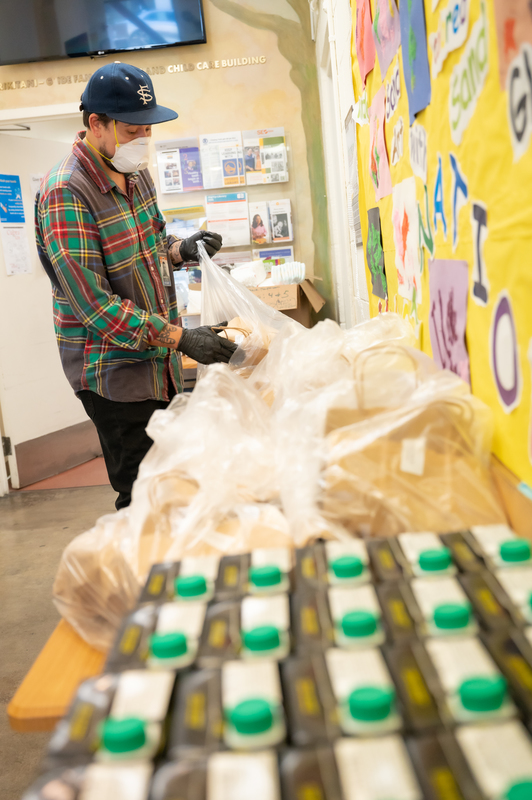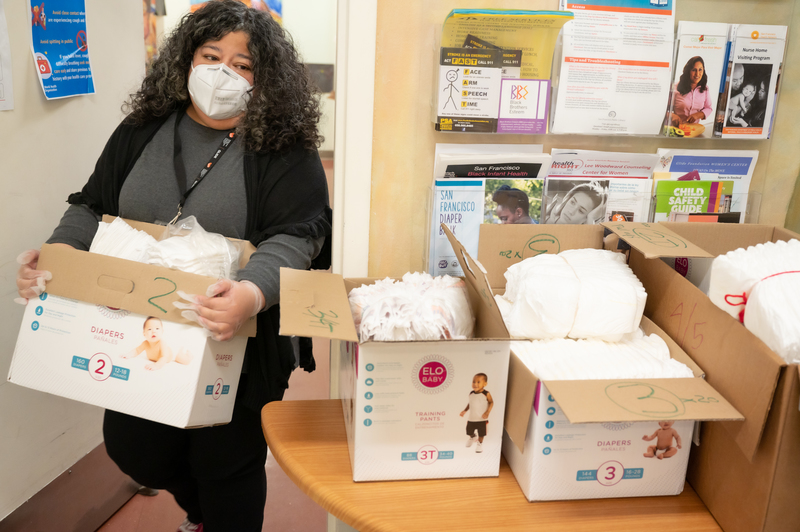GLIDE’s Family, Youth and Childcare Center staff support families through exceptionally challenging times
Despite needing to temporarily pause all on-site programming, GLIDE’s Family Youth and Childcare Center (FYCC) has been busy supporting its families in ways tailored to the particular challenges—and increasing need—brought on by the COVID-19 crisis. From the first days of the shelter-in-place order, FYCC staff members mobilized to distribute food and other basic necessities from FYCC’s lobby door on Ellis Street, working tirelessly to provide vulnerable families and children in the Tenderloin with the support they desperately need.
“It was pouring rain on the first day of food distribution,” recalls FYCC Director Lanie Igtanloc of that afternoon in March. “I didn’t expect many families to come but, to my surprise, the parents were lined up.
“Despite the rain, you could see the tears and stress in their expressions,” she continues. “Many of them told me that they didn’t have the money to buy enough food or stock up on essentials. I just kept telling everyone the same thing, ‘We are here for you. We will continue to be here for you.’”
The coronavirus pandemic has given us all a new awareness of the landscape of limited choices. But for those whose choices were already highly restricted—low-income families whose lives were never safe or easy—the reality of this pandemic is starkly different. Navigating the structural disadvantages and restricted-access resources has only become more complex for people like FYCC’s hard-working but very-low-income parents, and the consequences of not succeeding have never been more dire. That’s why FYCC’s devoted staff have been stepping up.
Over 400 families are enrolled in FYCC. Before the arrival of the coronavirus, a typical weekday included afterschool programing for youth in grades K-5, a Family Resource Center offering parenting workshops and family case management, as well as licensed childcare and early education services for children 18 months to 5 years old. There were constantly family events and field trips happening simultaneously.
But in the last three months, the building has become unusually still, no longer animated by the joy and laughter of children or the multilingual conversations with parents picking up their kids or consulting with a teacher. Instead, all of this activity has had to adapt to the new circumstances brought on by pandemic.
“The building is typically so lively,” notes Anthony, the FYCC Building Coordinator. “As soon as you stepped inside, the space was alive with all the teachers and parents coming and going. Now it is quiet,” he says. “The silence stands out.”
Despite the silence on-site, Anthony and his colleagues have remained busy.
Many of the families who live in the Tenderloin, including many FYCC families, had jobs in the hospitality and service industries, and so were among the first to be out of work as the pandemic forced a general lockdown in the Bay Area.
Since the start of the pandemic in March, Anthony has been overseeing the emergency food distribution program at FYCC. “I have years of experience with operations,” he explains. “But I had no idea how food distribution works. I just knew I had to jump in. We weren’t going to let any of our families go hungry.”
With the help of supporters like Project Isaiah and Gate Gourmet, First Five, GLIDE’s Daily Free Meals team, and generous donations from across our community, FYCC is able to distribute meals and critical supplies to families in the Tenderloin three days a week.
“We have been collecting feedback from parents on what to include in the distribution, to get a sense of what they really need,” Anthony explains. “The focus is on pantry items and dry goods, considering we don’t know how long this pandemic will go on.”
In the quest for creative solutions to the growing need, FYCC’s teachers have also started a series of online cooking classes, showing families how to prepare nutritious meals with the groceries they pick up at FYCC. Each bag includes a recipe tailored to the ingredients distributed that week and designed to ensure families get the nutrition they need despite the limited options available to unemployed parents.

Helping families navigate resources and meet immediate needs
With many millions of Americans filing unemployment claims as a result of the COVID-19 crisis, more and more people are experiencing firsthand just how impersonal, invasive and confusing the process of receiving benefits can be.
“For the first two weeks, most the of the questions were about rent,” says Lanie. “We were overwhelmed with helping parents figure out how to apply for unemployment and navigate where to find financial resources.”
Of course, the pandemic also closed schools and daycares. And given the risk of contagion, support networks have become more limited. The stress of being unemployed in an increasingly precarious economy is compounded by having the children home all day, often in small, cramped spaces. And while the burdens of COVID-19 continue to mount for low-income families, immigrant families are facing a unique range of barriers.
“When school districts first started giving out meals, they required parents to bring a child and identification,” Lanie explains. “Many families were coming to FYCC for support because we don’t ask about their immigration status.” While the Unified School District eventually stopped asking for IDs, the trust established between the frontline staff at FYCC and families has proven to be essential in combatting the deepening inequality caused by the pandemic.
Beyond immediate needs
Selina is the Afterschool Program Manager and has worked at FYCC for over 11 years.
“I have known many of these families for years,” she says with affection in her voice. “They are basically an extension of my own family.”
FYCC teachers prioritize family engagement as part of a child’s education. Integral to the reinvention of afterschool online programming was the engagement of not only children, but their parents too. Through virtual platforms like Zoom and ClassDojo, parents and children bond in Baby and Me classes, read books together, and participate in science experiments and children’s homework assignments.
Technology poses an additional challenge to remote learning for low-income families. Many don’t have internet access or laptops. In an attempt to bridge the digital divide, FYCC staff are collaborating with the Unified School District as well as GLIDE’s Fund Development team to provide one laptop or tablet per family.
This online programming has proved especially important for immigrant families who relied on afterschool programs to help their children learn English. These online platforms are opening up new avenues for parents who previously were unable to participate in their children’s studies.
“Our entire staff speaks Spanish,” notes Selina, “but now the variety of linguistic options on these virtual platforms allow the families who speak Arabic and other languages to interact in ways they may not have felt comfortable with before.”

In this together
As the shelter-in-place continues, FYCC staff members continue to improvise, expanding the range of available resources for the community, building up their inventory of everything from baby formula, feminine products, toilet paper and diapers to cleaning products, deodorant, information on dental resources, and ever more activities for the children—including books and art supplies.
The lift is a heavy one because the need is great.
“It often feels like we are walking a fine line of trying to provide everything but knowing we can’t,” admits Anthony with audible exhaustion. “We are doing the best we can to provide the resources most needed.”
As FYCC’s director, Lanie understands that her staff have much to deal with in their own lives, even as they devote themselves wholeheartedly to FYCC’s families.
“Many FYCC staff are in their 60s,” Lanie explains. “Most are living in the East Bay with long commutes with families of their own at home.”
“Not only are we fighting to advocate for low-income families in the Tenderloin, but we are trying not to become overwhelmed ourselves,” she says. “Each day requires motivation.”
She adds with pride, “The fact that my staff overcomes all the fear and all the obstacles for the sake of the welfare of families here at FYCC shows you the true power of community.”
By Erin Gaede
